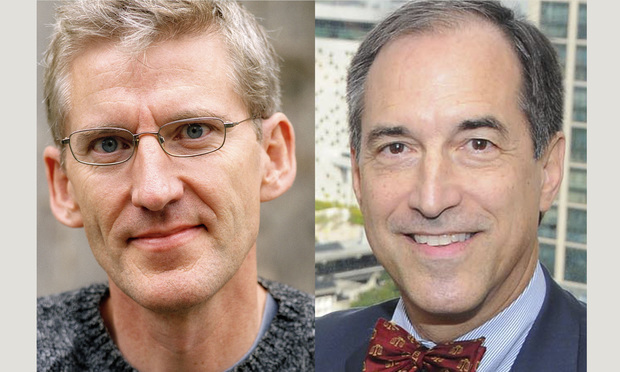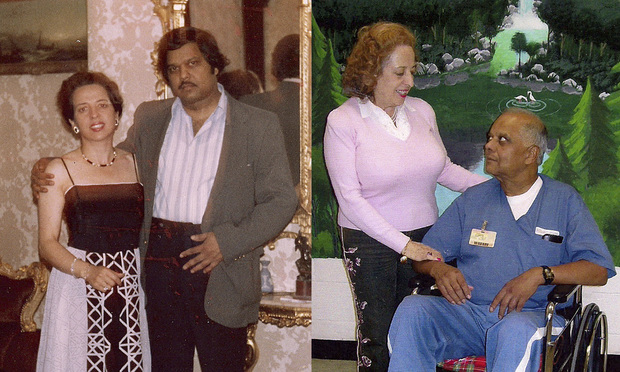South Florida Lawyer Works to Free British Man Who Claimed Pablo Escobar's Cartel Framed Him
"I don't think your client passes out in shock unless he genuinely is innocent," said one attorney.
July 01, 2020 at 02:39 PM
7 minute read
 Clive Stafford Smith, left, and Benedict Kuehne, right. Courtesy photos.
Clive Stafford Smith, left, and Benedict Kuehne, right. Courtesy photos.
It's been 27 years since Miami lawyer Benedict Kuehne and U.K. attorney Clive Stafford Smith began fighting for the release of a British citizen and former millionaire, jailed for a double murder he claims drug lord Pablo Escobar ordered back in Miami's infamous "cocaine cowboys" era.
And now, a glimmer of hope, as a federal magistrate judge is poised to decide whether to grant an evidentiary hearing reexamining his trial.
Krishna Maharaj was convicted in 1986 of killing father-and-son businessmen Derrick and Duane Moo Young in Room 1215 of Miami's DuPont Plaza hotel. But Maharaj has always maintained his innocence.
Long trek
When Kuehne and Stafford Smith joined forces to represent Maharaj in 1993, the attorneys say they never expected they would still be filing motions in 2020.
But here they are, still working on a case that's been fraught with intrigue and drama as it's flip-flopped through state and federal courts, and involved most of the characters featured in the Netflix show "Narcos."
But most crucially, the attorneys say, it's a case that demonstrates how failings in Florida's criminal justice system have created a personal tragedy for Maharaj, who's now 81 and suffering from declining health.
"Kris Maharaj passed a lie detector test saying he was innocent with one of the most respected polygraphers in America, and when the jury found him guilty he passed out, he fainted, because he was so shocked," Stafford Smith said. "I don't think your client passes out in shock unless he genuinely is innocent."
The most recent twist stemmed from two trips to Colombia, where Stafford Smith obtained statements from six Colombian cartel members who admitted to the murders and said Maharaj had no involvement. They claimed the men were killed for stealing money it were supposed to launder.
But although U.S Magistrate Judge Alicia Otazo Reyes in the Southern District of Florida has ruled that Kuehne and Stafford Smith met the standard of proving Maharaj is innocent by clear and convincing evidence, it will take more than that to free him.
That's thanks to U.S. legal standard established in Herrera v. Collins, which Stafford Smith says is "interesting intellectually, but actually mad practically," as Otazo Reyes will also have to find Maharaj didn't receive a fair trial.
"It's plausible in our mad world that we could prove by compelling, overwhelming evidence that he's innocent, but that you can apparently have a fair trial that reaches the wrong result, which is just deranged," Stafford Smith said.
Also concerned that Maharaj will contract COVID-19, the attorneys have moved for conditional medical release. But the Florida Department of Corrections found he isn't eligible.
"Should a client whose penalty does not include death at the hands of the state be required to essentially die in prison, where that person is in very poor physical medical shape?" Kuehne said.
The Florida Department of Corrections said it's prohibited from discussing inmate's personal health information.
"FDC takes this responsibility seriously. Information about an inmate's health status released by attorneys or other parties cannot be acknowledged, explained, corrected or even addressed by FDC. This would include whether or not any inmate was recommended for conditional medical release by FDC," the FDC said. "Ensuring inmates incarcerated in Florida's prisons receive the appropriate level of medical and behavioral treatment is one of FDC's core constitutional responsibilities."
'I'd already written the op-ed'
Maharaj was originally sentenced to death and secured a resentencing trial 10 years later.
But a unique Florida rule meant there was one catch: Kuehne and Stafford Smith couldn't argue Maharaj was innocent unless they wanted to go to prison for contempt.
"Every other state in the union that has the death penalty disagrees with Florida," Stafford Smith said. "Where Florida has a position that says that if you've been convicted and you're facing a resentencing trial, you're not allowed to contest whether you're actually guilty or not."
This time around, Maharaj received a life sentence and will be eligible for parole when he's 101. It's a result Kuehne and Stafford Smith say is an alarming indictment of Florida's criminal justice system.
Despite new evidence, including testimony from a former DEA agent and an ex-hitman that pointed to Escobar, Miami-Dade Circuit Judge William Thomas upheld Maharaj's conviction in 2015.
"I'd already written the op-ed congratulating Judge Thomas for granting a new trial because it was so obvious that he ought to do that," Stafford Smith said. "And it just about made me pass out when he ruled against us."
Now, they argue Maharaj's trial was unfair because the government covered up exculpatory evidence from the defense, allegedly failing to disclose information that a cartel hitman was in the room across the hall from the murders, and that the victims were found with documents linking them to money laundering.
"Had those two things been disclosed to the defense, the case of Kris Maharaj would have taken back in 1986, a completely different form," Kuehne said.
Getting evidence wasn't easy, according to Stafford Smith, as two witnesses were kidnapped in Colombia while trying to find out the truth, only just managing to escape.
 Krishna Maharaj and his wife Marita, in an undated photo, left, and the couple pictured in 2012, right. Courtesy photos.
Krishna Maharaj and his wife Marita, in an undated photo, left, and the couple pictured in 2012, right. Courtesy photos.'We've failed him'
It's a pro bono case for Kuehne, who said it's also his go-to example for seminars about the importance of perseverance in criminal defense.
"We have looked under ever rock, pored through every nook and cranny to find evidence to satisfy the legal claims for actual innocence," Kuehne said. "Without perseverance, without an unerring sense of justice, Kris's case would have long been abandoned, and he would have been one of those many actual innocents whose case never sees the light of day."
And of the more than 400 death penalty cases Stafford Smith has handled through his civil rights organization Reprieve, Maharaj's was the one he wrote a book about.
"It's the one that I'm most perplexed about," Stafford Smith said. "Because I've won lots of cases on technical legal issues, and yet here's someone who is utterly patently innocent and thus far we've failed him."
Maharaj has remained uninterested in cutting a deal with the government, according to his lawyers, and his 80-year-old wife, Marita, is still living in Florida, waiting for him to come home.
"He's amazing in the sense that he continues to be absolutely certain that he's going to be exonerated," Stafford Smith said. "Every time we have a hearing, he expects it to be the last hearing that finally brings justice to him. And I don't know how, after all these years. … He's promised me he's going to stay alive, both for his wife and so that Ben and I can exonerate him."
Read more: Florida Criminal Defense Lawyers Eyeing Civil Work? How COVID-19 is Affecting Attorney Income
COVID-19 Couldn't Stop This Case: Inside South Florida's Last Federal Jury Trial
This content has been archived. It is available through our partners, LexisNexis® and Bloomberg Law.
To view this content, please continue to their sites.
Not a Lexis Subscriber?
Subscribe Now
Not a Bloomberg Law Subscriber?
Subscribe Now
NOT FOR REPRINT
© 2025 ALM Global, LLC, All Rights Reserved. Request academic re-use from www.copyright.com. All other uses, submit a request to [email protected]. For more information visit Asset & Logo Licensing.
You Might Like
View All
Vedder Price Shareholder Javier Lopez Appointed to Miami Planning, Zoning & Appeals Board
2 minute read

Crypto Entrepreneur Claims Justice Department’s Software Crackdown Violates US Constitution
4 minute readTrending Stories
- 1Contract Technology Provider LegalOn Launches AI-powered Playbook Tool
- 2Court of Appeals Provides Comfort to Land Use Litigants Through the Relation Back Doctrine
- 3Amid the Tragedy of the L.A. Fires, a Lesson on the Value of Good Neighbors
- 4Democracy in Focus: New York State Court of Appeals Year in Review
- 5In Vape Case, A Debate Over Forum Shopping
Who Got The Work
J. Brugh Lower of Gibbons has entered an appearance for industrial equipment supplier Devco Corporation in a pending trademark infringement lawsuit. The suit, accusing the defendant of selling knock-off Graco products, was filed Dec. 18 in New Jersey District Court by Rivkin Radler on behalf of Graco Inc. and Graco Minnesota. The case, assigned to U.S. District Judge Zahid N. Quraishi, is 3:24-cv-11294, Graco Inc. et al v. Devco Corporation.
Who Got The Work
Rebecca Maller-Stein and Kent A. Yalowitz of Arnold & Porter Kaye Scholer have entered their appearances for Hanaco Venture Capital and its executives, Lior Prosor and David Frankel, in a pending securities lawsuit. The action, filed on Dec. 24 in New York Southern District Court by Zell, Aron & Co. on behalf of Goldeneye Advisors, accuses the defendants of negligently and fraudulently managing the plaintiff's $1 million investment. The case, assigned to U.S. District Judge Vernon S. Broderick, is 1:24-cv-09918, Goldeneye Advisors, LLC v. Hanaco Venture Capital, Ltd. et al.
Who Got The Work
Attorneys from A&O Shearman has stepped in as defense counsel for Toronto-Dominion Bank and other defendants in a pending securities class action. The suit, filed Dec. 11 in New York Southern District Court by Bleichmar Fonti & Auld, accuses the defendants of concealing the bank's 'pervasive' deficiencies in regards to its compliance with the Bank Secrecy Act and the quality of its anti-money laundering controls. The case, assigned to U.S. District Judge Arun Subramanian, is 1:24-cv-09445, Gonzalez v. The Toronto-Dominion Bank et al.
Who Got The Work
Crown Castle International, a Pennsylvania company providing shared communications infrastructure, has turned to Luke D. Wolf of Gordon Rees Scully Mansukhani to fend off a pending breach-of-contract lawsuit. The court action, filed Nov. 25 in Michigan Eastern District Court by Hooper Hathaway PC on behalf of The Town Residences LLC, accuses Crown Castle of failing to transfer approximately $30,000 in utility payments from T-Mobile in breach of a roof-top lease and assignment agreement. The case, assigned to U.S. District Judge Susan K. Declercq, is 2:24-cv-13131, The Town Residences LLC v. T-Mobile US, Inc. et al.
Who Got The Work
Wilfred P. Coronato and Daniel M. Schwartz of McCarter & English have stepped in as defense counsel to Electrolux Home Products Inc. in a pending product liability lawsuit. The court action, filed Nov. 26 in New York Eastern District Court by Poulos Lopiccolo PC and Nagel Rice LLP on behalf of David Stern, alleges that the defendant's refrigerators’ drawers and shelving repeatedly break and fall apart within months after purchase. The case, assigned to U.S. District Judge Joan M. Azrack, is 2:24-cv-08204, Stern v. Electrolux Home Products, Inc.
Featured Firms
Law Offices of Gary Martin Hays & Associates, P.C.
(470) 294-1674
Law Offices of Mark E. Salomone
(857) 444-6468
Smith & Hassler
(713) 739-1250







